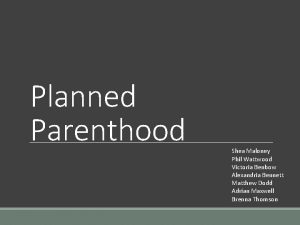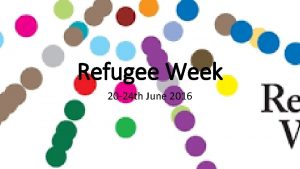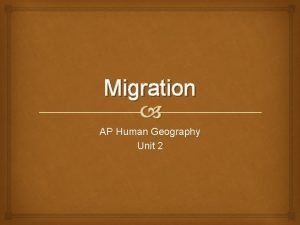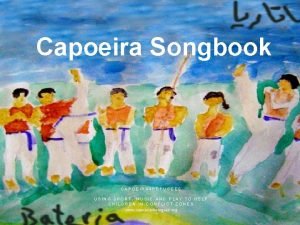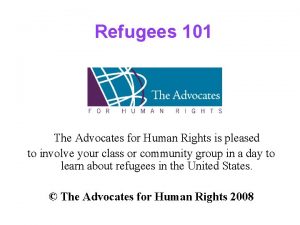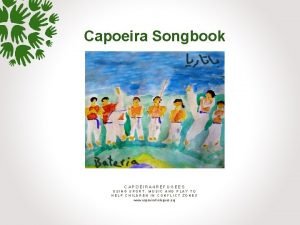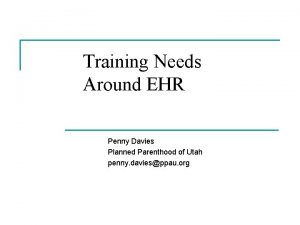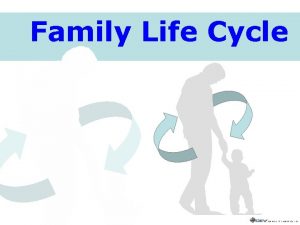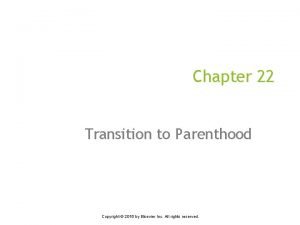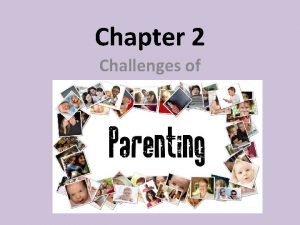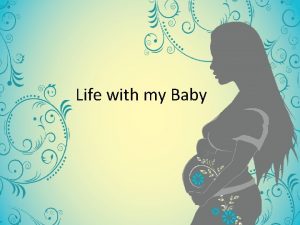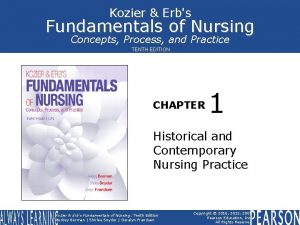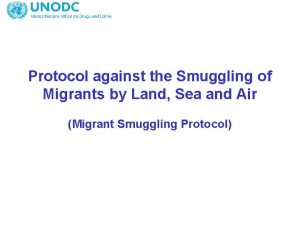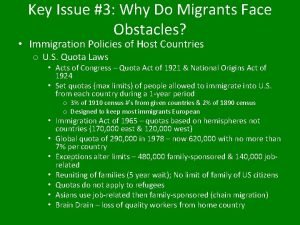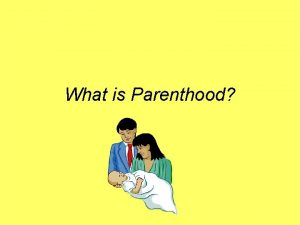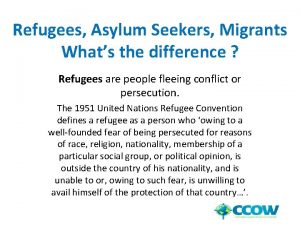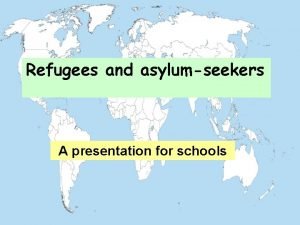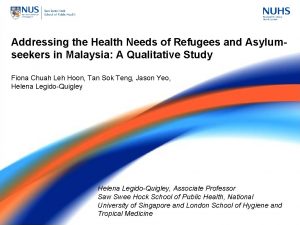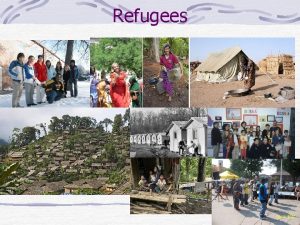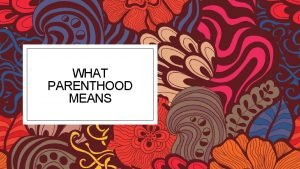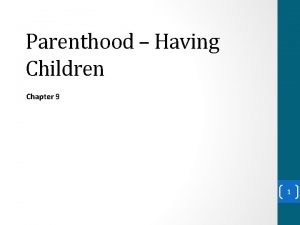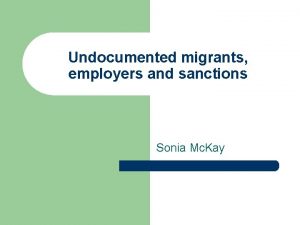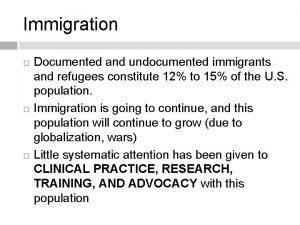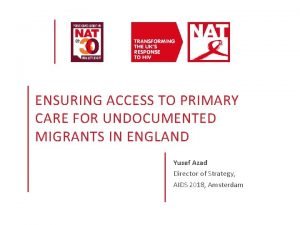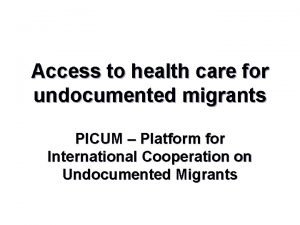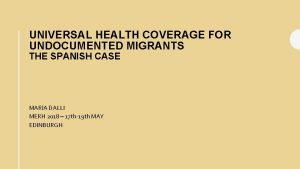Refugees asylumseekers and undocumented migrants and parenthood Living
















- Slides: 16

Refugees, asylum-seekers and undocumented migrants and parenthood: Living transnationally Lisa Merry, Sandra Pelaez, Nancy Edwards

Objective: To synthesize the recent qualitative literature and identify the integrative themes describing the parenthood experiences of refugees, asylum-seekers and undocumented migrants Merry L, Pelaez S, Edwards NC. Refugees, Asylum-seekers, Undocumented Migrants and the Experience of Parenthood: A synthesis of the qualitative literature. Globalization and Health. 2017; 13: 75.

Methods: § Seven online databases for the period Jan 2006 to Feb 2017 § French and English peer-reviewed articles and graduate-level dissertations § Qualitative literature that examined the parenthood experiences* of refugees, asylum-seekers and undocumented migrants * • Experience of becoming a parent and/or the experience of parenting (i. e. , the process of supporting the physical, social, psychological and intellectual development) a child/children including teenagers and youth

Methods: § Data extracted and descriptively summarised included: • Paper characteristics: publication year, language, and discipline • Study information: the objective, research design, the data collection methods, country location and migrant population studied § Thematic analysis was used to identify integrative themes that reflected and described the parenthood experiences of refugees, asylum-seekers and undocumented migrants across the research

Results

Results Descriptor Location of study United States Europe Australia or New Zealand Canada Israel LMIC Migration Source Region Latin America Sub-Saharan Africa South East Asia North Africa and/or Middle Eastern Europe or Russia South Asia N= 138 studies 54. 3 % (75) 14. 5 % (20) 12. 3 % (17) 2. 2 % (3) 2. 2% (3) 44. 9 % (62) 39. 9 % (55) 15. 2 % (21) 13. 8 % (19) 8. 7 % (12) 8. 0 % (11) Descriptor Migrant group Undocumented Refugee Asylum-seeker Parents Mothers Fathers Mothers and fathers Mothers and extended family Mothers, fathers and extended family N= 138 studies 44. 9 % (62) 54. 3 % (75) 7. 2 % (10) 50. 7 % (70) 6. 5 % (9) 37. 7 % (52) 2. 2 % (3) 2. 9 % (4)

Results Descriptor Location of study United States Europe Australia or New Zealand Canada Israel LMIC Migration Source Region Latin America Sub-Saharan Africa South East Asia North Africa and/or Middle Eastern Europe or Russia South Asia N= 138 studies 54. 3 % (75) 14. 5 % (20) 12. 3 % (17) 2. 2 % (3) 2. 2% (3) 44. 9 % (62) 39. 9 % (55) 15. 2 % (21) 13. 8 % (19) 8. 7 % (12) 8. 0 % (11) Descriptor Migrant group Undocumented Refugee Asylum-seeker Parents Mothers Fathers Mothers and fathers Mothers and extended family Mothers, fathers and extended family N= 138 studies 44. 9 % (62) 54. 3 % (75) 7. 2 % (10) 50. 7 % (70) 6. 5 % (9) 37. 7 % (52) 2. 2 % (3) 2. 9 % (4)

Results Descriptor Location of study United States Europe Australia or New Zealand Canada Israel LMIC Migration Source Region Latin America Sub-Saharan Africa South East Asia North Africa and/or Middle Eastern Europe or Russia South Asia N= 138 studies 54. 3 % (75) 14. 5 % (20) 12. 3 % (17) 2. 2 % (3) 2. 2% (3) 44. 9 % (62) 39. 9 % (55) 15. 2 % (21) 13. 8 % (19) 8. 7 % (12) 8. 0 % (11) Descriptor Migrant group Undocumented Refugee Asylum-seeker Parents Mothers Fathers Mothers and fathers Mothers and extended family Mothers, fathers and extended family N= 138 studies 44. 9 % (62) 54. 3 % (75) 7. 2 % (10) 50. 7 % (70) 6. 5 % (9) 37. 7 % (52) 2. 2 % (3) 2. 9 % (4)

Results Descriptor Location of study United States Europe Australia or New Zealand Canada Israel LMIC Migration Source Region Latin America Sub-Saharan Africa South East Asia North Africa and/or Middle Eastern Europe or Russia South Asia N= 138 studies 54. 3 % (75) 14. 5 % (20) 12. 3 % (17) 2. 2 % (3) 2. 2% (3) 44. 9 % (62) 39. 9 % (55) 15. 2 % (21) 13. 8 % (19) 8. 7 % (12) 8. 0 % (11) Descriptor Migrant group Undocumented Refugee Asylum-seeker Parents Mothers Fathers Mothers and fathers Mothers and extended family Mothers, fathers and extended family N= 138 studies 44. 9 % (62) 54. 3 % (75) 7. 2 % (10) 50. 7 % (70) 6. 5 % (9) 37. 7 % (52) 2. 2 % (3) 2. 9 % (4)

Results Descriptor Location of study United States Europe Australia or New Zealand Canada Israel LMIC Migration Source Region Latin America Sub-Saharan Africa South East Asia North Africa and/or Middle Eastern Europe or Russia South Asia N= 138 studies 54. 3 % (75) 14. 5 % (20) 12. 3 % (17) 2. 2 % (3) 2. 2% (3) 44. 9 % (62) 39. 9 % (55) 15. 2 % (21) 13. 8 % (19) 8. 7 % (12) 8. 0 % (11) Descriptor Migrant group Undocumented Refugee Asylum-seeker Parents Mothers Fathers Mothers and fathers Mothers and extended family Mothers, fathers and extended family N= 138 studies 44. 9 % (62) 54. 3 % (75) 7. 2 % (10) 50. 7 % (70) 6. 5 % (9) 37. 7 % (52) 2. 2 % (3) 2. 9 % (4)

Results Descriptor Location of study United States Europe Australia or New Zealand Canada Israel LMIC Migration Source Region Latin America Sub-Saharan Africa South East Asia North Africa and/or Middle Eastern Europe or Russia South Asia N= 138 studies 54. 3 % (75) 14. 5 % (20) 12. 3 % (17) 2. 2 % (3) 2. 2% (3) 44. 9 % (62) 39. 9 % (55) 15. 2 % (21) 13. 8 % (19) 8. 7 % (12) 8. 0 % (11) Descriptor Migrant group Undocumented Refugee Asylum-seeker Parents Mothers Fathers Mothers and fathers Mothers and extended family Mothers, fathers and extended family N= 138 studies 44. 9 % (62) 54. 3 % (75) 7. 2 % (10) 50. 7 % (70) 6. 5 % (9) 37. 7 % (52) 2. 2 % (3) 2. 9 % (4)

Results: integrative themes 1) Experiencing hardship and loss in the context of precarious migration and past traumas • Fear of deportation and family separation, ineligible for services • Parenthood result of rape, past memories of war and loss of family affect relationships with children and intensifies safety concerns for children

Results: integrative themes 2) Building resilience and strength by bridging language, norms and expectations • Children source of strength and justification for sacrifice • Family, faith and maintenance of language and culture key resources • New languages and ways of doing empowering for parents and children

Results: integrative themes 3) Living transnationally: obligations, movements & resources • Supporting family and parenting children back home • Transnational ties maintained through serial migration, deportation and return migration • Transnational support and resources

Implications § Perspectives of fathers and extended family members § Needs of asylum-seeker parents § Research in LMIC contexts § Address issues related to migrant parents’ precarious status and effects of trauma, which pose unique challenges for these families § Enhance strength and resilience of migrant families § A transnational lens may be beneficial § Addressing transnational concerns (e. g. , family separation and reunification) § Acknowledging transnational resources and fostering a transnational identity § Conducting transnational research

Thank you! Lisa. merry@umontreal. ca
 Defunding planned parenthood pros and cons
Defunding planned parenthood pros and cons Refugees brian bilston lesson
Refugees brian bilston lesson Emigration definition ap human geography
Emigration definition ap human geography Capoeira 4 refugees
Capoeira 4 refugees Refugees
Refugees Capoeira 4 refugees
Capoeira 4 refugees Planned parenthood ehr
Planned parenthood ehr Family life cycle diagram
Family life cycle diagram Chapter 22 transition to parenthood
Chapter 22 transition to parenthood Medfusion planned parenthood
Medfusion planned parenthood Galinsky's stages of parenthood
Galinsky's stages of parenthood The parenthood decision
The parenthood decision The parenthood decision
The parenthood decision Safe sleep seven
Safe sleep seven Berman snyder & frandsen 2016
Berman snyder & frandsen 2016 Protocol against the smuggling of migrants
Protocol against the smuggling of migrants Why do migrants face obstacles?
Why do migrants face obstacles?
